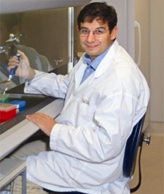Biomarkers, Pathology Help Target Breast Cancer Treatment
The combination of biomarkers and molecular pathology will aid oncologists in developing targeted treatments for breast cancer, according to Samuel Aparicio, MD, PhD, who will be delivering a presentation on recognizing breast cancer heterogeneity in targeted treatment at the Miami Breast Cancer Conference this week.
Samuel Aparicio, MD, PhD

The combination of biomarkers and molecular pathology will aid oncologists in developing targeted treatments for breast cancer, according to Samuel Aparicio, MD, PhD, who will be delivering a presentation on recognizing breast cancer heterogeneity in targeted treatment at the Miami Breast Cancer Conference this week.
Dr. Aparicio's focus on breast cancer research is driven, in part, by personal tragedy.
“My mum died from breast cancer before she ever got to meet any of my children. And now, I’m the proud father of four daughters. I want to help create a better world for my girls so that they will never have to live with the burden of breast cancer. They may still get cancer in their lifetimes, but I want it to be a much easier and more successful journey.”
Among his many achievements, he decoded the genetic evolution of a breast cancer tumor by mapping all three billion letters in the DNA sequence of two tumors from the same breast cancer patient-a primary tumor and a metastatic tumor that were biopsied nine years apart. His discovery found that the mutations in the tumors had dramatically shifted as the disease spread.
Dr. Aparicio is currently the Nan and Lorraine Robertson Chair of Breast Cancer in Vancouver, BC, and the Canada Research Chair in Molecular Oncology at the University of British Columbia and BC Cancer Agency. He spoke with CancerNetwork from his laboratory in Vancouver and discussed two elements that oncologists should keep in mind when developing targeted treatments for breast cancer.
“I think there are two factors that will prove to be important. One is the availability of a biomarker, which will guide the indications for therapy in the genetic sense.
“By that, I mean, that increasingly targeted agents are focused toward a genetic or genomic aberration that we know is present in the cancers. I think the availability of a biomarker diagnostic as a companion is essential.
“I think the other key component is to understand from the molecular pathology of the cancer whether heterogeneity is present, or the markers that we know about, and try to consider rational combinations of treatment.”